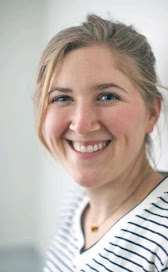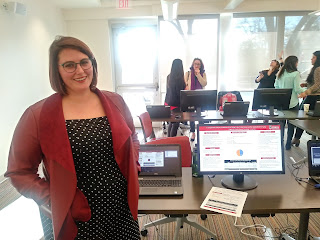“If you want to go quickly, go alone. If you want to go far, go together.” – African Proverb
 |
| Mallory Vaughn MSW/MPH (Dec '19) |
It seems sometimes, especially in the land of professionalism and academia, we like to separate ourselves into boxes where we can easily fit. Sometimes there is this tendency to prefer to “go it alone,” and rely on a particular profession’s areas of expertise rather than as a collaboration, as collaboration often takes more time to perfect. This is fantastic in terms of allowing for greater specialization and expertise in very specific areas, yet at times, the boxes we create for each discipline can hamper our ability for interdisciplinary collaboration and even prevent us from seeing the bigger picture.
I have always tended to lean more towards the interdisciplinary side of things and the benefit of having multiple disciplines in my toolbox. From being a double major, learning in multiple languages, and finally having an undergraduate thesis that pulled from a wide range of disciplines including English literature, anthropology, psychology, and even political science. It seemed like every experience I had, the edge I had in each one came from the ability to pull from as many perspectives and as many academic departments as possible to get a full picture of the problem. Now, pursuing my Master of Social Work and Master of Public Health, the need for interdisciplinary collaboration and the ability to learn from multiple lenses is clearer to me now more than ever.
To me, the definition of a dual professional is more about the unique abilities dual professionals are able to acquire through working within multiple areas. Working within multiple disciplines as a dual professional also includes several assets specific to transdisciplinary work, such as the ability to view things from multiple perspectives, critical thinking and evaluation skills, and intellectual dexterity between knowledge and information from a wider range of perspectives and disciplines (Repko et al., 2014).
Social work and public health are particularly suited for dual professionalism and collaboration, as social work can provide public health with an individual-level perspective to public health’s population level health challenges (Ruth, Sisco & Marshall, 2008). Public health social work is also able to blend social work’s problem solving and community empowering skills with public health’s emphasis on long term prevention, and provides a socio-epidemiological perspective in terms of dealing with health problems (Jackson, 2015). Social work and public health are particularly complementary fields not only because of their potential for collaborative problem solving and interventions but also because their ideals and ethics overlap in many areas. Both the NASW code of ethics and public health’s ethical guidelines both highlight the importance of ethical engagement with the community, engaging with marginalized voices, and promoting social justice (Congress, 2013).
One of the benefits of being a dual professional is that we get to serve as a link between two disparate professions that actually aren’t as different as they might appear at first glance. As a bridge between multiple fields, we have the opportunity to combine our public health skills of assessing population health issues, our knowledge of biostatistics and epidemiology, and our ability to engage in high-level discourse on a variety of health issues with our social work skills of empathy, creativity, communication, and community-level advocacy. Not only does this give us tremendous skills to use in our work going forward, it also places us in a unique position to act as a liaison between multiple fields and encourage even more transdisciplinary cooperation. As I continue to work towards becoming a dual social work and public health professional, I hope to continue to foster collaboration and cooperation between these two disciplines and encourage a wider range of perspectives to contribute to solutions to the health problems and disparities that continue to challenge our communities.
- Mallory Vaughn graduated from the MSW/MPH program in December 2019
Mallory is currently working as a Family Connection Coordinator at Catoosa Family Collaborative.
View Mallory's Linkedin Profile hereReferences:
- Congress, E. (2013). Ethics for public health social workers. In R. H. Keefe & E. T. Jurkowski (Eds), Handbook for public health social work (pp. 21-40). New York, NY: Springer.
- Jackson, K. (2015, November/December). Public Health Social Work: Now More than Ever. Retrieved April 30, 2019, from https://www.socialworktoday.com/archive/111715p12.shtml
- Repko, A.F., Szostak, R., Buchberger, M.P. (2014). Chapter 3: The Interdisciplinary Studies “Cognitive Toolkit.” In Introduction to Interdisciplinary Studies (pp. 49-61). Los Angeles, CA: SAGE.
- Ruth, B. J., Sisco, S., & Marshall, J. W. (2008). Public health social work. Encyclopedia of social work, 3, 476-483.



